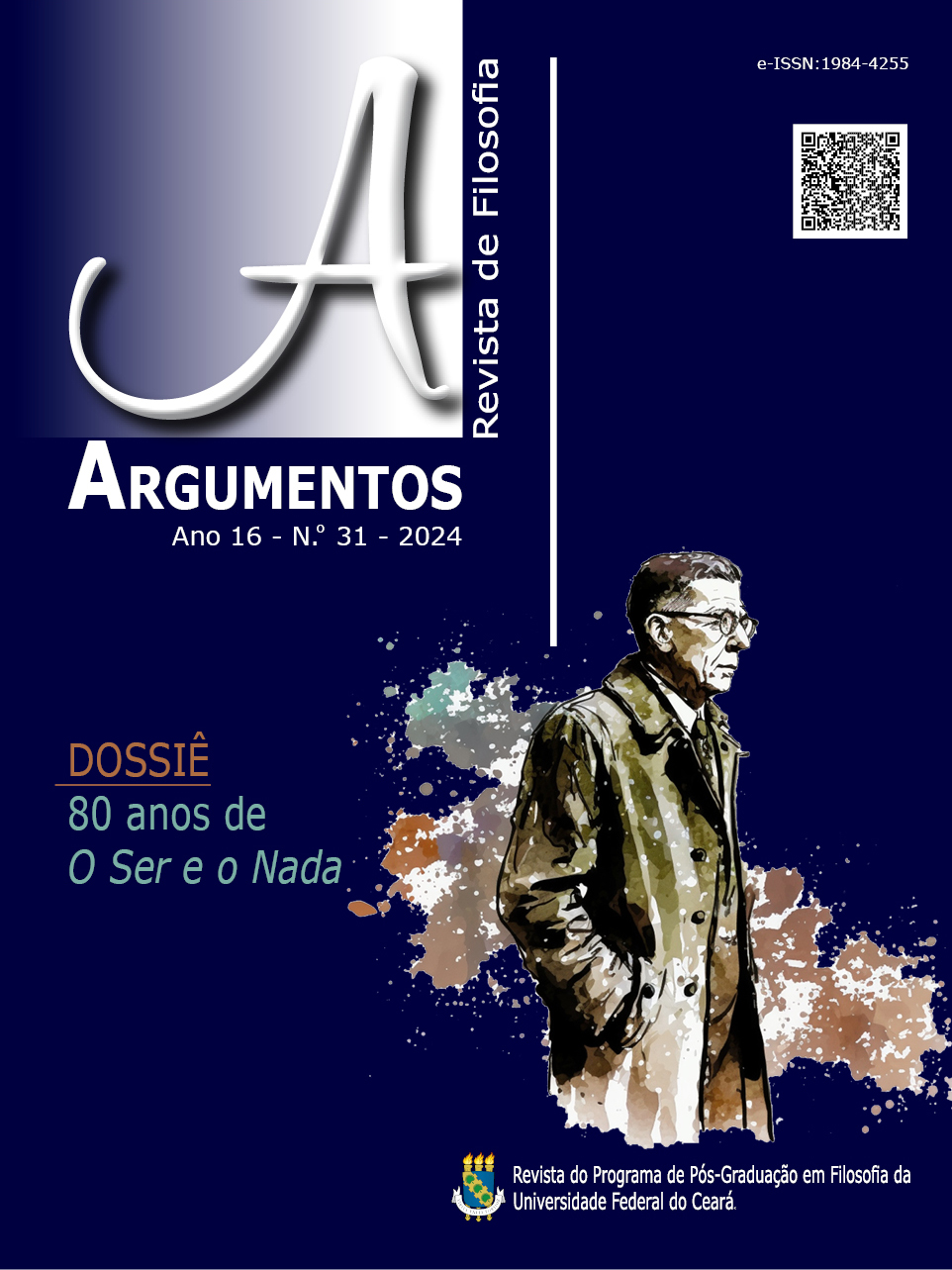The philosophical journey to Being and Nothingness: how many “phenomenologies” does it take to make a phenomenological ontology?
DOI:
https://doi.org/10.36517/Argumentos.31.3Keywords:
Jean-Paul Sartre. Phenomenology. Ontology. French Existentialism.Abstract
This paper intends to recover the “phenomenological” basis of Sartre’s trajectory since his very first reception of Edmund Husserl’s and Martin Heidegger’s philosophies until the moment in which the main synthesis of his existentialism is published, entitled Being and Nothingness (1943). In this sense, the paper situates the status of Husserl’s and Heidegger’s phenomenologies for Sartrean thought, as well as the originality of Being and Nothingness, which is also influenced by a very particular interpretation of Hegelian negation.
References
BEAUVOIR, S. A Força da Idade. Rio de Janeiro: Nova Fronteira, 1984.
BLIGH, R. The Réalité-humaine of Henry Corbin. 146p. Tese (Doutorado em Filosofia) – University of London, London, 2011.
CABESTAN, P. L’Être et la Conscience: recherches sur la psychologie et l’ontophénoménologie sartriennes. Bruxelas: Ousia, 2004.
COHEN-SOLAL, A. Sartre: 1905-1980. Paris: Gallimard, 1999.
COOREBYTER., D. V. Introduction. In: SARTRE, J.-P. La Transcendance de l’Ego et autres textes Phénoménologiques. Paris: Vrin, 2003.
COOREBYTER, D. V. Sartre face à la Phénoménologie: autour de “L’Intentionnalité” et de “La transcendance de l’ego”. Bruxelles: Ousia, 2000.
DESANTI, J-T. L’Être et le Néant à 50 ans. 1993. Disponível em: https://www.lemonde.fr/archives/article/1993/07/02/l-etre-et-le-neant-a-cinquante-ans-le-philosophe-jean-toussaint-desanti--explique-comment-fut-accueilli-en-1943-le-maitre-livre-desartre_3947060_1819218.html.
HEIDEGGER, M. Carta sobre el Humanismo. Madrid: Alianza Editorial, 2006.
HEIDEGGER, M. Ser e Tempo. Campinas: Editora da Unicamp; Petrópolis: Editora Vozes, 2012.
HUSSERL, E. Experience and Judgment. London: Routledge, 1973.
HUSSERL, E. Investigaciones Lógicas. Vol. 1. Madrid: Alianza Editorial,1999.
HUSSERL, E. Méditations Cartésiennes. Paris: J. Vrin, 1980.
KEMP, P. Le non de Sartre à la Logique de Hegel. Revue de Théologie et de Philosophie, Genebra, v. 20, n. 5, p. 289-300, 1970.
KOJÈVE, A. Introduction à la Lecture de Hegel. Paris: Gallimard, 2000. (Collection Tel).
LAVIGNE, J.-F. Husserl et la Naissance de la Phénoménologie. Paris: PUF, 2005.
LEVINAS, E. The Theory of Intuition in Husserl’s Phenomenology. Evanston: Northwestern University Press, 1995.
MOUILLIE, J-M. Sartre et la Phénoménologie. Lyon: ENS Éditions, 2001.
MÜLLER, M. L. Sartre e a Crise do Fundamento. Doispontos, Curitiba/São Carlos, v. 3, n. 2, p. 11-28, 2006.
RICOEUR, P. O Conflito das Interpretações. Porto: Rés, 1988.
SARTRE, J.-P. A Imaginação. Porto Alegre: L&PM, 2008.
SARTRE, J.-P. A Transcendência do Ego (seguido de Consciência de si e Conhecimento de si). Lisboa: Edições Colibri, 1994.
SARTRE, J.-P. Diário de uma Guerra Estranha: setembro de 1939-março de 1940. Rio de Janeiro: Nova Fronteira, 2005.
SARTRE, J.-P. Esboço para uma Teoria das Emoções. Porto Alegre: L&PM, 2006.
SARTRE, J.-P. L’Être et le Néant: essai d’ontologie phénoménologique. Paris: Gallimard, 2001.
SARTRE, J.-P. O Imaginário. São Paulo: Ática, 1996.
SARTRE, J.-P. Que é Literatura? São Paulo: Ática, 2004.
SARTRE, J.-P. Une idée Fondamentale de la Phénoménologie de Husserl: l’Intencionalité. In: SARTRE, J.-P. Situation I. Paris: Gallimard, 1992.
Downloads
Published
Issue
Section
License
Argumentos magazine is licensed under an International Creative Commons Attribution License.
The Magazine uses CC BY inclusion
1) The authors retain the copyright granted to the magazine or the right to initial publication, with the work regularly licensed under the Creative Commons Attribution, which allows the sharing of the work with acknowledgment of authorship and initial publication in this magazine.
2) The authors are authorized to contract additional applicable contracts, for non-exclusive distribution of the version of the work published in this journal (for example, publication in the institutional repository or as a chapter of the book), recognition of authorship and initial publication in this journal.
3) Authors are authorized and encourage to publish and distribute their work online (for example, in institutional repositories or on their personal pages) at any time before or during the editorial process, as they can generate productive changes, as well as increase the impact and reference of published work.




.jpg)










._._3.png)
1.jpg)
._._._.png)
